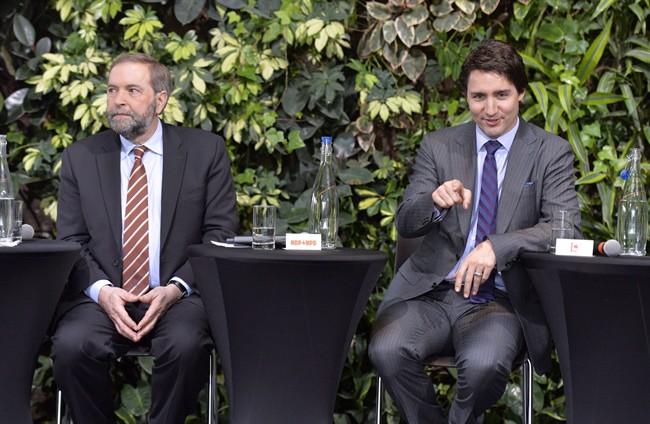As Oct. 19 approaches, Canadians still seem divided about which federal party should form their next government.

Several polls have shown the Conservatives pulling ahead (slightly or not-so-slightly) in both voting intention and in seat projections, while most pollsters now agree that the NDP is suffering a major slide in the final weeks of the campaign — a so-called “Orange Crash.” The number-crunchers also agree that a minority government is a likely outcome of this long and unusually tight race.
Which brings up the question of coalitions — and, more specifically, some kind of arrangement between the Liberals and the NDP — in the event that Stephen Harper ekes out a narrow victory.
In 2011, the very notion of such a union was considered so unpalatable that the Conservatives managed to successfully use it to attack both opposition parties, telling voters that the only way to prevent a “reckless opposition coalition” on Parliament Hill would be to give them a majority. Canadians obliged.
Four years later, however, the electorate seems to be leaning heavily towards change, and the most recent survey conducted by Ipsos on behalf of Global News suggests that if a coalition is what it takes to make that change happen, half of voters would support it.
The poll found that 50 per cent of respondents felt that, in the event of a Tory minority, “the Liberals and the NDP should immediately defeat the government when the House of Commons returns, and the Liberals and NDP should cooperate to govern.” While such a move would not break any rules, the other half felt the Conservatives should be given the opportunity to govern before any action is taken.
“I thought you would see support for taking out the government at a much higher level,” said Ipsos CEO Darrell Bricker.
“It shows me that as we get closer to the end of this, it will become more of an issue.”
Similar surveys conducted by other polling firms in recent weeks have mirrored the Ipsos results. Trudeau and Mulcair have each steered clear of any promise of a potential deal between their two parties before election day. Similarly, they have been less-than-forthcoming about how they might, in theory, approach a coalition after Oct. 19, although Trudeau seems to have ruled out any formal merger.
It’s unclear if voters would be more keen on a formal coalition — which historians argue has not truly happened since the time of Confederation — or simply a promise made by the two parties to cooperate and support each other in the House of Commons.
To even talk about these scenarios at this point would only open the parties up to attack, Bricker noted.
“The worst circumstance for Liberals and NDP is for Harper to turn on them and say … ‘we’re going to get the most expensive parts of both their (respective) platforms.’”
There are other reasons an NDP-Liberal coalition may not be on the table. Trudeau stated publicly in April that he wouldn’t even consider cooperation with the NDP unless Mulcair was personally out of the picture. Mulcair says Trudeau “has slammed the door shut conclusively every time we’ve raised (the idea of a coalition).” It’s not exactly the stuff that happy marriages are made of.
And then there are the policy differences. The Liberals and NDP have opposing views on the Trans-Pacific Partnership trade agreement, for example, with the Liberals saying they are pro-trade but will review the tentative deal carefully, and the NDP saying they will never support it. The TPP is likely to be one of the first things dealt with after the election.
While reluctant to talk about joining forces in any capacity, the two main opposition parties have been clear on one point: they will not prop up a Harper-led minority government.
Mulcair was particularly biting in his response to a reporter’s question about whether he’d ever help the Conservative leader, telling reporters “there isn’t a snowball’s chance in Hell.”



Comments